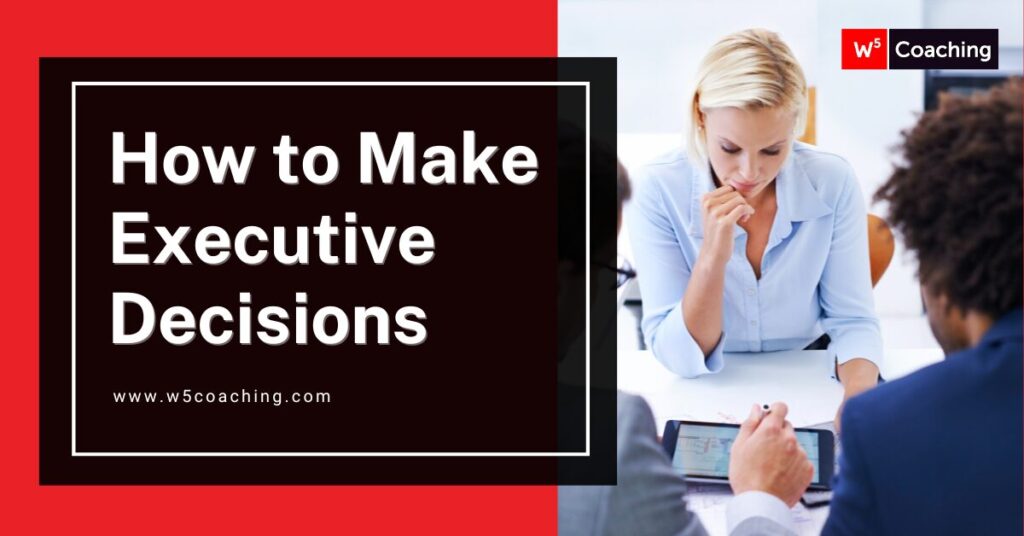How to Make Good Business Decisions

How to Make Good Business Decisions
As the owner of the business, one of your most important jobs is to make decisions.
It’s your role to make decisions about the direction of your company, who to hire, what you’re going to sell (and for how much), what markets to enter, and which customers to pursue.
The key to doing this well is to have a system to cut down on distractions so that you can think clearly and make the right choices.
In short, you need to make decisions like an executive.
Here are three strategies I used as a CEO that you may find helpful.
1. Get the Information You Need
 Good decisions begin with getting the information you need to make them.
Good decisions begin with getting the information you need to make them.
Get the numbers
Would you get on an airplane if you knew the pilot didn’t have a flight plan?
Your financial numbers and projections are like a flight plan for your business.
If your decision has a financial component to it (and most business decisions DO) then make sure you’ve got good financial information to base your decision on.
Filter first
Remember that decisions can be broken into 2 components: filtering and organizing, followed by the decision itself.
Have your VA or executive assistant filter and prepare the information you need.
Teach your team to communicate using a BLUF (bottom-line up-front) approach to ensure that you can quickly understand what they’re asking for.
2. Seek Outside Perspective and Expertise
As your business continues to grow, you’ll be hiring more and more people who know things that you don’t.
This requires both a new level of delegation – and a new level of management.
You’ll need to not only trust them to do their jobs – you’ll also need to rely on them to bring you the information you need to make good decisions.
A good way to get into this habit is to ask your staff to bring you 3 solutions whenever they bring you a problem. Then ask them which solution they think is best.
This is also where having a business coach or advisor can be invaluable.
My clients often use me as a sounding board – someone they can think out loud with, who will ask good questions, and provide feedback and perspective as needed.
Because I’m at arm’s length and not emotionally invested in their business, I can often spot issues or provide solutions that they wouldn’t come up with on their own.
3. Trust Your Intuition
 My clients are often surprised by how quickly I can diagnose their problems and prescribe a solution.
My clients are often surprised by how quickly I can diagnose their problems and prescribe a solution.
I attribute this to my intuition. I’ve been a business coach for 20 years. I’ve worked with over 400 clients. Before that, I had a long career as an executive.
Because of my background, I have a huge amount of experience to draw on. I know what to do because I’ve seen the situation so many times before.
Intuition isn’t just a random feeling, it’s actually the processing of hundreds and hundreds of data points.
Trusting your gut can lead to sound decision-making, provided you’ve accumulated a wealth of knowledge and experience over the years.
Wayne Gretzky is a good example of this. He became the greatest hockey player of all time by using his intuition to skate to where the puck was going to be.
Don’t Overthink
Very few decisions are irreversible.
You’re not always going to get it right, but you’ll usually have a chance to fix it.
I look at it like this: your intuition is your internal GPS. Sometimes we miss a turn, but we always get to recalculate.
There is a lot of wisdom in this quote by Maimonides:
“The risk of a wrong decision is preferable to the terror of indecision.”
If you find decision-making challenging, if you’re prone to over-thinking, or if you constantly feel you’re on the horns of a dilemma – book a call here to discuss business coaching: Book a Call with John.
My clients will tell you that the call will be a good decision. 🙂

Build a Self-Managing Company
How to build a business that runs smoothly, profitably, and (mostly) without you.
Feeling stressed out and overwhelmed with a business that is taking all your time - and not giving you enough in return?
Are you finding it challenging to hire the right team (and get them to do the right things)?
I wrote this little guide for you!
Enter your details below to receive your free copy!
